This Week in Freethought History (June 2-8)
Here’s your week in Freethought History. This is more than just a calendar of events or mini-biographies – it’s a reminder that, no matter how isolated and alone we may feel at times, we as freethinkers are neither unique nor alone in the world.
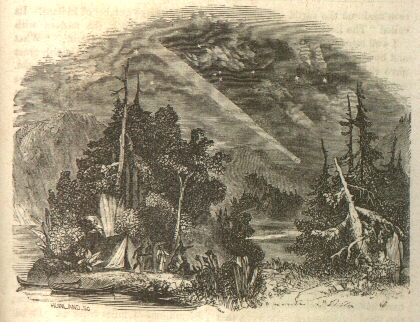 Last Sunday, June 2, but in 1858, the Italian astronomer Giovanni Battista Donati (1826-1873) observed and recorded the first appearance of the comet that bears his name today. The astronomer was 32 at the time and the Donati Comet is one of six he discovered. Throughout human history, while stars and meteors were usually seen as good signs, the appearance of a comet in the skies has been interpreted as a fireball flung by an angry God. The superstition was a burden on human progress: If a comet portended pestilence, it was God’s will and therefore useless to attempt to cure diseases. If a comet portended war, rather than wise statesmanship, princes must instead raise the sword and carry out God’s bloody will. The belief that comets presaged wars is memorialized in the Bayeux Tapestry, where a comet can be seen signaling the Norman Conquest of 1066. Donati estimated that his comet has an orbital period of more than 2000 years, so perhaps we humans, if we do not annihilate ourselves, will cast off a few more superstitions by the time Donati’s Comet returns!
Last Sunday, June 2, but in 1858, the Italian astronomer Giovanni Battista Donati (1826-1873) observed and recorded the first appearance of the comet that bears his name today. The astronomer was 32 at the time and the Donati Comet is one of six he discovered. Throughout human history, while stars and meteors were usually seen as good signs, the appearance of a comet in the skies has been interpreted as a fireball flung by an angry God. The superstition was a burden on human progress: If a comet portended pestilence, it was God’s will and therefore useless to attempt to cure diseases. If a comet portended war, rather than wise statesmanship, princes must instead raise the sword and carry out God’s bloody will. The belief that comets presaged wars is memorialized in the Bayeux Tapestry, where a comet can be seen signaling the Norman Conquest of 1066. Donati estimated that his comet has an orbital period of more than 2000 years, so perhaps we humans, if we do not annihilate ourselves, will cast off a few more superstitions by the time Donati’s Comet returns!
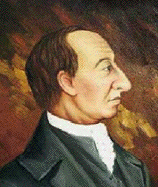 Last Monday, June 3, but in 1726, the Scot called “the first great British geologist,” James Hutton was born. Hutton studied medicine, took his degree, but, there being no employment for him, he almost gave up science for agriculture. In 1785, Hutton submitted a paper to the newly established Royal Society of Edinburgh outlining his Theory of the Earth, an idea that pretty much invented the science of geology. But this theory flew in the face of the Biblical teaching that the earth had been transformed only once, catastrophically, by a universal Flood. Since the beginning of the Christian Era, the book of Genesis was the only acceptable book of geology. Before fundamentalist Islam clamped shut Muslim minds, Avicenna in the 11th century came up with a gradualist theory of the formation of the earth. But in Christian Europe the clerics thought research into the age of rocks distracted the mind from the Rock of Ages – and led to infidelity and Atheism. Only with James Hutton, and later with Darwin, was the truth of the scientific theory of gradualism gradually accepted.
Last Monday, June 3, but in 1726, the Scot called “the first great British geologist,” James Hutton was born. Hutton studied medicine, took his degree, but, there being no employment for him, he almost gave up science for agriculture. In 1785, Hutton submitted a paper to the newly established Royal Society of Edinburgh outlining his Theory of the Earth, an idea that pretty much invented the science of geology. But this theory flew in the face of the Biblical teaching that the earth had been transformed only once, catastrophically, by a universal Flood. Since the beginning of the Christian Era, the book of Genesis was the only acceptable book of geology. Before fundamentalist Islam clamped shut Muslim minds, Avicenna in the 11th century came up with a gradualist theory of the formation of the earth. But in Christian Europe the clerics thought research into the age of rocks distracted the mind from the Rock of Ages – and led to infidelity and Atheism. Only with James Hutton, and later with Darwin, was the truth of the scientific theory of gradualism gradually accepted.
 Also last Tuesday, June 4, but in 1975, American actress, film director, and screenwriter Angelina Jolie was born. Daughter of Oscar-winning actor Jon Voight (Midnight Cowboy, 1969; Deliverance, 1972; The Odessa File, 1974; Coming Home, 1978), Jolie won herself an Oscar for her supporting role in Girl, Interrupted (1999), as well as Golden Globes for George Wallace (1997) and Gia (1998). She has starred in such successful films as the two Lara Croft Tomb Raider films (2001, 2003), Mr. & Mrs. Smith (2005), Wanted (2008), Salt (2010), A Mighty Heart (2007) and Changeling (2008). Jolie has done humanitarian work as a Special Envoy and former Goodwill Ambassador for the United Nations High Commissioner for Refugees (UNHCR). Acclaimed by many sources at various times as the most beautiful woman in the world, Jolie has the distinction of a species of trapdoor spider, native to Northern California, being named after her: Aptostichus angelinajolieae. She was briefly married to actor Billy Bob Thornton and is currently partnered with actor Brad Pitt, who shares her religious indifferentism. In a 6 September 2000 interview with The Onion A.V. Club, she was asked, “Is there a God?” Angelina Jolie replied, “Hmm … For some people. I hope so, for them. For the people who believe in it, I hope so. There doesn’t need to be a God for me. There’s something in people that’s spiritual, that’s godlike. I don’t feel like doing things just because people say things, but I also don’t really know if it’s better to just not believe in anything, either.” Jolie remarked in a 29 December 2004 interview in The Sun, “I have a Buddhist son and I’d like a Christian and a Muslim child, too” (as if children can choose their religion), by which she may mean she views all religions as equally valid. Or Angelina Jolie thinks that meaning in life can be found everywhere, such as in family and in global humanitarian work, though she never mentions religion and humanitarian work in the same breath!
Also last Tuesday, June 4, but in 1975, American actress, film director, and screenwriter Angelina Jolie was born. Daughter of Oscar-winning actor Jon Voight (Midnight Cowboy, 1969; Deliverance, 1972; The Odessa File, 1974; Coming Home, 1978), Jolie won herself an Oscar for her supporting role in Girl, Interrupted (1999), as well as Golden Globes for George Wallace (1997) and Gia (1998). She has starred in such successful films as the two Lara Croft Tomb Raider films (2001, 2003), Mr. & Mrs. Smith (2005), Wanted (2008), Salt (2010), A Mighty Heart (2007) and Changeling (2008). Jolie has done humanitarian work as a Special Envoy and former Goodwill Ambassador for the United Nations High Commissioner for Refugees (UNHCR). Acclaimed by many sources at various times as the most beautiful woman in the world, Jolie has the distinction of a species of trapdoor spider, native to Northern California, being named after her: Aptostichus angelinajolieae. She was briefly married to actor Billy Bob Thornton and is currently partnered with actor Brad Pitt, who shares her religious indifferentism. In a 6 September 2000 interview with The Onion A.V. Club, she was asked, “Is there a God?” Angelina Jolie replied, “Hmm … For some people. I hope so, for them. For the people who believe in it, I hope so. There doesn’t need to be a God for me. There’s something in people that’s spiritual, that’s godlike. I don’t feel like doing things just because people say things, but I also don’t really know if it’s better to just not believe in anything, either.” Jolie remarked in a 29 December 2004 interview in The Sun, “I have a Buddhist son and I’d like a Christian and a Muslim child, too” (as if children can choose their religion), by which she may mean she views all religions as equally valid. Or Angelina Jolie thinks that meaning in life can be found everywhere, such as in family and in global humanitarian work, though she never mentions religion and humanitarian work in the same breath!
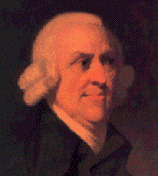 Last Wednesday, June 5, but in 1723, Scottish economist Adam Smith was born. Early in his education, while attending Glasgow and Oxford Universities, he adopted the philosophy of fellow Scot David Hume (1711-1776), who later became a good friend. He declined an obligation to enter the Scottish ministry, but instead at age 28 became a professor of logic, and later of moral philosophy while still living at home with his mother. He would remain there all his life, never marrying. Clerical Scotland was startled to read Smith’s 1759 Theory of Moral Sentiments, a work that espoused a naturalist, that is to say, a Deistic world view. The clerical reaction persuaded Smith that further advocacy of the idea that morality comes not from God but from sympathy, would not help his career. Smith visited Voltaire at Geneva, who persuaded Smith to believe that, “Science is the great antidote to the poison of enthusiasm and superstition.” And he began to work out his own ideas on political economy. In the same year that his friend David Hume died, 1776, Smith published the work that entitles him to be called “the father of British political economy”: Inquiry Into the Nature and Causes of the Wealth of Nations, popularly known as Wealth of Nations. When Hume died, Smith edited some of his friend’s non-controversial papers for publication and even wrote a sympathetic life of Hume, which Chalmers’ General Biographical Dictionary describes as “a powerful blow against Christianity.” The work caused such a stir among the clergy in Scotland, especially from the Bishop of Norwich, John Home (1722-1808), who practically accused Smith of Atheism. But Smith was trying to make a living as a public employee, so he remained silent about his religious beliefs. It is generally accepted that Adam Smith was at most a Deist, but considering how close he was to Hume, he may in fact have been an Agnostic.
Last Wednesday, June 5, but in 1723, Scottish economist Adam Smith was born. Early in his education, while attending Glasgow and Oxford Universities, he adopted the philosophy of fellow Scot David Hume (1711-1776), who later became a good friend. He declined an obligation to enter the Scottish ministry, but instead at age 28 became a professor of logic, and later of moral philosophy while still living at home with his mother. He would remain there all his life, never marrying. Clerical Scotland was startled to read Smith’s 1759 Theory of Moral Sentiments, a work that espoused a naturalist, that is to say, a Deistic world view. The clerical reaction persuaded Smith that further advocacy of the idea that morality comes not from God but from sympathy, would not help his career. Smith visited Voltaire at Geneva, who persuaded Smith to believe that, “Science is the great antidote to the poison of enthusiasm and superstition.” And he began to work out his own ideas on political economy. In the same year that his friend David Hume died, 1776, Smith published the work that entitles him to be called “the father of British political economy”: Inquiry Into the Nature and Causes of the Wealth of Nations, popularly known as Wealth of Nations. When Hume died, Smith edited some of his friend’s non-controversial papers for publication and even wrote a sympathetic life of Hume, which Chalmers’ General Biographical Dictionary describes as “a powerful blow against Christianity.” The work caused such a stir among the clergy in Scotland, especially from the Bishop of Norwich, John Home (1722-1808), who practically accused Smith of Atheism. But Smith was trying to make a living as a public employee, so he remained silent about his religious beliefs. It is generally accepted that Adam Smith was at most a Deist, but considering how close he was to Hume, he may in fact have been an Agnostic.
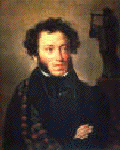 Last Thursday, June 6, but in 1799, the founder of modern Russian literature, Alexander S. Pushkin (Алекса́ндр С. Пу́шкин) was born. His family was aristocratic but poor. Nevertheless, Pushkin managed to acquire an education and between 1811-1817 he began writing his first major work, Ruslan and Ludmila (Руслан и Людмила), a fairy story in verse based on Russian folk tales his grandmother had told him – in French. Pushkin’s masterpiece, Eugene Onegin (Евге́ний Оне́гин), a novel in verse published between 1823 and 1831, features a duel between his characters, Lensky and Onegin, over a woman named Olga. Life imitates art: In Moscow Pushkin met, and in 1831 married, the beautiful 16-year-old, Natalia Goncharova. Pushkin was twice her age. But rumors of Natalia’s infidelities afflicted Pushkin. She was seen with the French Baron George-Charles Dantes once too often at social functions, so Pushkin felt compelled to challenge Dantes to a duel on November 16, 1836.
Last Thursday, June 6, but in 1799, the founder of modern Russian literature, Alexander S. Pushkin (Алекса́ндр С. Пу́шкин) was born. His family was aristocratic but poor. Nevertheless, Pushkin managed to acquire an education and between 1811-1817 he began writing his first major work, Ruslan and Ludmila (Руслан и Людмила), a fairy story in verse based on Russian folk tales his grandmother had told him – in French. Pushkin’s masterpiece, Eugene Onegin (Евге́ний Оне́гин), a novel in verse published between 1823 and 1831, features a duel between his characters, Lensky and Onegin, over a woman named Olga. Life imitates art: In Moscow Pushkin met, and in 1831 married, the beautiful 16-year-old, Natalia Goncharova. Pushkin was twice her age. But rumors of Natalia’s infidelities afflicted Pushkin. She was seen with the French Baron George-Charles Dantes once too often at social functions, so Pushkin felt compelled to challenge Dantes to a duel on November 16, 1836.
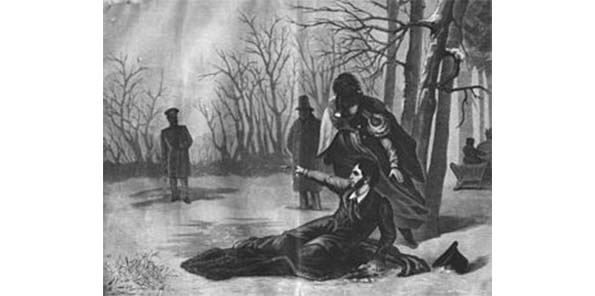 Dueling was one of the more noxious innovations introduced after Europe was compelled to adopt Christianity. So much for the claim that Christianity tamed the passions of the barbarians! The practice was not confined to men: in the Middle Ages, women fought their own duels – sometimes against men. In 1165, Pope Alexander II, instead of condemning duels, simply forbade wounded priests from saying Mass. If anything, the practice expanded during the so-called Age of Chivalry. As late as 1830 London newspapers carried advertisements for how-to books on dueling. Spain, France, Britain, Ireland, Russia, Germany and the rest of the Christianized world had their own longstanding traditions of settling insults to honor through personal combat – and no gentle Galilean stood in their way. In the US, perhaps the most famous duel was on 11 July 1804, when Aaron Burr shot Alexander Hamilton. Dueling was not just about blood for honor. Pushkin’s duel extinguished a brilliant poet’s life: shot on a snow-covered field outside of St. Petersburg, he died from his wounds two days later. It was 10 February 1837, and Pushkin was 37. What great works might he yet have created? A monument stands in the very center of Moscow where, on this date each year, people gather to honor the memory of Alexander Pushkin, cut down by a bullet that no creed tried to stop.
Dueling was one of the more noxious innovations introduced after Europe was compelled to adopt Christianity. So much for the claim that Christianity tamed the passions of the barbarians! The practice was not confined to men: in the Middle Ages, women fought their own duels – sometimes against men. In 1165, Pope Alexander II, instead of condemning duels, simply forbade wounded priests from saying Mass. If anything, the practice expanded during the so-called Age of Chivalry. As late as 1830 London newspapers carried advertisements for how-to books on dueling. Spain, France, Britain, Ireland, Russia, Germany and the rest of the Christianized world had their own longstanding traditions of settling insults to honor through personal combat – and no gentle Galilean stood in their way. In the US, perhaps the most famous duel was on 11 July 1804, when Aaron Burr shot Alexander Hamilton. Dueling was not just about blood for honor. Pushkin’s duel extinguished a brilliant poet’s life: shot on a snow-covered field outside of St. Petersburg, he died from his wounds two days later. It was 10 February 1837, and Pushkin was 37. What great works might he yet have created? A monument stands in the very center of Moscow where, on this date each year, people gather to honor the memory of Alexander Pushkin, cut down by a bullet that no creed tried to stop.
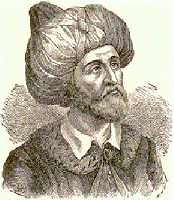 Yesterday, June 7, but in 732, Muhammad, the founder of Islam, died of a stroke at Medina. Muhammad (محمد) was born on a date uncertain in 570 in Mecca, in what is now Saudi Arabia, orphaned, brought up by an uncle, and became a camel driver and shepherd as a boy. Muhammad thought it tragic that his Arab race were idolaters and polytheistic, so in 610 (he was about 40) he started having visions from the Angel Gabriel and began a life as a prophet and teacher. Islam (الإسلام), means “submission,” as in submission to the one God. In 622 Muhammad was forced to flee from Mecca to Yathrib, which is now called Medina, and found his religion welcomed there. The date of that flight is called the hegira (هجرة) and that event marks the beginning of the Muhammadan era. The holy book of Islam, the Qur’an (القرآن), means “the recitation” or “the lesson” – of Allah. Because Muhammad was illiterate, he memorized his visions and dictated them afterwards, sometimes long enough afterwards to have forgotten contradictory earlier visions.
Yesterday, June 7, but in 732, Muhammad, the founder of Islam, died of a stroke at Medina. Muhammad (محمد) was born on a date uncertain in 570 in Mecca, in what is now Saudi Arabia, orphaned, brought up by an uncle, and became a camel driver and shepherd as a boy. Muhammad thought it tragic that his Arab race were idolaters and polytheistic, so in 610 (he was about 40) he started having visions from the Angel Gabriel and began a life as a prophet and teacher. Islam (الإسلام), means “submission,” as in submission to the one God. In 622 Muhammad was forced to flee from Mecca to Yathrib, which is now called Medina, and found his religion welcomed there. The date of that flight is called the hegira (هجرة) and that event marks the beginning of the Muhammadan era. The holy book of Islam, the Qur’an (القرآن), means “the recitation” or “the lesson” – of Allah. Because Muhammad was illiterate, he memorized his visions and dictated them afterwards, sometimes long enough afterwards to have forgotten contradictory earlier visions.
Inasmuch as the Qur’an reflects the ideas of Muhammad, a few points need to be made. First, neither in Islamic history nor in the Qur’an is Islam anymore a “religion of peace” than Christianity – like Christianity, it all depends on what you accept and what you reject in your interpretation of your holy book. Second, and for the same reason as Christianity, it is not true that Islam is a tolerant religion. If we discount the early suras in the Koran, which were revealed when Muhammad was struggling for acceptance, and concentrate on the later ones, written when Muhammad was master of Arabia, you will understand the context of holy words such as these—
[22.9] As for the unbelievers, for them garments of fire shall be cut and there shall be poured over their heads boiling water whereby whatever is in their bowels and skins shall be dissolved and they will be punished with hooked iron rods.”
[47.4] “When you meet the unbelievers, strike off their heads; then when you have made wide slaughter among them, carefully tie up the remaining captives.
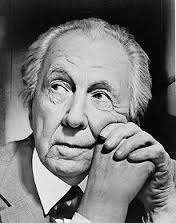 Today, June 8, but in 1867, American architect Frank Lloyd Wright was born. He was brought up a Unitarian. He studied civil engineering at the University of Wisconsin and got his first architectural job at a firm in Chicago. Between 1893 and 1909 Wright began to develop his “Prairie House” concept of design. He acquired hundreds of commissions over his long career: the Imperial Hotel in Tokyo, Fallingwater, the Price Tower skyscraper, the Guggenheim Museum, the Marin County Civic Center, and his own home in Wisconsin, Taliesen. About religion, Wright said, “I believe in God, only I spell it Nature.” Indeed, he stressed, “Nature is my manifestation of God. I go to nature every day for inspiration in the day’s work. I follow in building the principles which nature has used in its domain” You could call Wright’s belief a sort of Pantheism, for Wright would say, “Study nature, love nature, stay close to nature. It will never fail you.” Said Wright, “God is the great mysterious motivator of what we call nature and it has been said often by philosophers, that nature is the will of God. And, I prefer to say that nature is the only body of God that we shall ever see. If we wish to know the truth concerning anything, we’ll find it in the nature of that thing.” Frank Lloyd Wright never retired, but died on 9 April 1959 at age 91. The epitaph at his Wisconsin grave site reads: “Love of an idea, is the love of God.”
Today, June 8, but in 1867, American architect Frank Lloyd Wright was born. He was brought up a Unitarian. He studied civil engineering at the University of Wisconsin and got his first architectural job at a firm in Chicago. Between 1893 and 1909 Wright began to develop his “Prairie House” concept of design. He acquired hundreds of commissions over his long career: the Imperial Hotel in Tokyo, Fallingwater, the Price Tower skyscraper, the Guggenheim Museum, the Marin County Civic Center, and his own home in Wisconsin, Taliesen. About religion, Wright said, “I believe in God, only I spell it Nature.” Indeed, he stressed, “Nature is my manifestation of God. I go to nature every day for inspiration in the day’s work. I follow in building the principles which nature has used in its domain” You could call Wright’s belief a sort of Pantheism, for Wright would say, “Study nature, love nature, stay close to nature. It will never fail you.” Said Wright, “God is the great mysterious motivator of what we call nature and it has been said often by philosophers, that nature is the will of God. And, I prefer to say that nature is the only body of God that we shall ever see. If we wish to know the truth concerning anything, we’ll find it in the nature of that thing.” Frank Lloyd Wright never retired, but died on 9 April 1959 at age 91. The epitaph at his Wisconsin grave site reads: “Love of an idea, is the love of God.”
Other birthdays and events this week—
June 4: Women got to vote in the United States, in spite of the churches (1919).
June 6: American actor and playwright, noted for his Torch Son Trilogy, Harvey Fierstein was born (1952).
June 8: German composer and music critic Robert Schumann was born (1810).
We can look back, but the Golden Age of Freethought is now. You can find full versions of these pages in Freethought history at the links in my blog, FreethoughtAlmanac.com.

